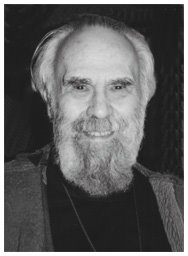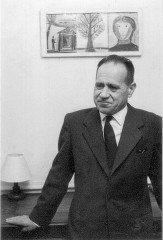Metropolitan Anthony's Sneaky Side...

One of the cool things about Gillian Crow's new book This Holy Man, about Metropolitan ANTHONY (Bloom) +2003, are the anecdotes of his life as a mercurial young man in Paris in the late 20's and 30's. This took place a few years before his monastic tonsure. Just so you know, the Metropolitan's baptismal name was Andrei.
From page 84-85:
Andrei had by this time developed an interest in homeopathy and he tried to set up as a homeopathic doctor, without success. The time was not ripe for alternative medicine. He retained his enthusiasm, however, and would often treat himself with homeopathic remedies.
As well as his work as a physician he continued his youth activities, including leading Bible study sessions in his house. These were a source of inspiration to the young people, one of whom was Nicholas, the son of Vladimir Lossky.
* * * * * * * *
Vladimir Lossky had chosen to remain a layman, despite being a renowned theologian. He was, in Metropolitan Anthony's words, one of the people in Paris who did most to promote Orthodoxy, not only among his fellow theologians but also in the world around him. He had refused to become a priest, saying that he accepted instead to be a lay theologian and, in the freedom that gave him, to convey Orthodoxy to whomever wished to hear about it. He was married, with a family of four children. How he and his wife treated them was something Andrei was never to forget.
'I called for them one Sunday - I was living across the street from them at the time on the Isle St Louis - on the way to the Liturgy. When I went into the house I found the parents kneeling in front of their children asking their forgiveness for any wrong that they had done them during the week. I have no doubt that action had more impact on their faith than any theological teaching Lossky might have given them.
However, the young Andrei was not above disagreeing with his friend when he thought fit. At one time, Lossky's opinion was that the Eastern religions had no proper knowledge or experience of God. Andrei did not dare to argue openly with such a distinguished person, about a somewhat controversial topic. 'But what courage couldn't achieve, cunning could,' he later said, and he decided to make his point in a way that his friend could not fail to respond to. Andrei slipped home and wrote out eight quotations from the Upanishads. He took them back to Lossky with an apparently innocent query.

'Could you help me? I have some sayings of the Fathers here and I can't remember who said what. Can you identify them for me, please?' Lossky went through the list and without hesitation wrote beside each quotation the relevant name: St. John Chrysostom, St. Basil the Great and so on. When the theologian had attributed them all, Andrei dropped his bombshell.
'It's the Upanishads.'
From then on, he said, Lossky began to look much more sympathetically at other faiths and came to find in them truths he had never before been able to acknowledge.
Tisk, tisk, tisk.
10 Comments:
Thomas Merton also discovered the mystery and beauty of eastern religions. There was also a book I heard about, Christ the Eternal Tao, which gave me pause. I don't really know how to digest this kind of mystery....
concerning merton...
"A new abbot allowed him the freedom to undertake a tour of Asia at the end of 1968, during which he memorably met the Dalai Lama in India. He also made a visit to Polonnaruwa (in what was then Ceylon), where he had a religious experience while viewing enormous statues of the Buddha. There is speculation that Merton wished to remain in Asia as a hermit. However, he died in Bangkok on 10th December 1968, having touched a badly-grounded electric fan while stepping out of his bath. His body was flown back to Gethsemani where he is buried. Since his death, his influence has continued to grow and he is considered by many to be a twentieth century American mystic..." (courtesy of wikipedia)
(ps: not to draw comparisons between Anthony Bloom and Thomas Merton, I haven't read enough of either to draw such comparisons...)
I quite like Merton. And I think he and Metropolitan Anthony may have shared some attitudes. His "Seven Storey Mountain" accompanied me on my long and wandering journey to the Orthodox Church. His "Alaskan Journal," which he wrote right before his "Asian Journal" in 1968 is pretty powerful and has some great essays about Alaskan Orthodoxy. I've heard about that "Christ the Eternal Tao" book but haven't read it yet. I think it's about St. Maximos the Confessor.
I know that Dr. Wee Chong Tan from All Saints in Victoria has written about how the concept of the "Tao" is similar to the way St. John uses the Greek concept of "Logos" to describe Christ.
All I know is that the Apostle Paul in Colossians says that Christ is "before" all things and that through Him all things came into existence. That is pretty deep. And I have a sense that His eternal light shone throughout all Creation, even prior to His Incarnation, even in the great wisdom traditions of other human religions. I've heard that on the outside of Orthodox Churches in Romania, for instance, are painted the Greek philosophers, Socrates and Plato.
But I'm with you, Victoria, I don't really know how to digest this kind of mystery, either... other than: "in the fear of God, with faith & love, draw near!"
Matthew, thank you for posting this!!! It is FASCINATING!
First of all, I am incredibly touched by the story of the Lossky's and the way they treated their children. That goes on my mental notes on raising children. Oh how excited I am to raise a family in the Orthodox Church, fully devoted to being instruments of God's love in this world! I am always amazed at how well respected children are in our church.
And secondly, I think a lot of the world's mystics, if their experiences are genuine, will inevitably find the same ultimate reality; that of the Incarnation of Jesus Christ. And of course if it is ultimate reality, we should expect the Gospel story appearing in all kinds of other places throughout history. I think it was C.S. Lewis that said once in an interview that he would be upset if there were no parallels to Christianity in other religions, from other eras, etc, because if what we believe is actually true, it follows that it would crop up all over the place. The whole of creation sings praises to God and points us to Him.
Glory to You, O God, for the depth of Your wisdom reflected in the whole world!
Oh, and you're right Matthew, Dr Tan, who by the way has pneumonia and needs your prayers, has an interesting book written on "Jesus in China", and has also translated many ancient Chinese texts with a Christian viewpoint. Very interesting. I will try to remember to bring a few copies when I come to visit you guys next.
Thanks for your notes, Mira! Dr. Tan sent me his books.
We'll be sure to keep in our prayers...
I'm reviewing "On Earth as It Is in Heaven" for the next edition of the Messenger. It's pretty interesting stuff, eh? Esp. the growing alfalfa in sand...
Hey Matt.
I found the link to your blog through Steve Tamburello's. Its been a while since I've been in touch with you. I hope you are doing well.
Mark (my blog is edifyingdiscourse.blogspot.com)
Hey Mark!
Great to hear from you... thanks for dropping by.
The word ‘humility’ comes from the Latin word ‘humus’ which means fertile ground. To me, humility is not what we often make of it: the sheepish way of trying to imagine that we are the worst of all and trying to convince others that our artificial ways of behaving show that we are aware of that. Humility is the situation of the earth. The earth is always there, always taken for granted, never remembered, always trodden on by everyone, somewhere we cast and pour out all the refuse, all we don’t need. It’s there, silent and accepting everything and in a miraculous way making out of all the refuse new richness in spite of corruption, transforming corruption itself into a power of life and a new possibility of creativeness, open to the sunshine, open to the rain, ready to receive any seed we sow and capable of bringing thirtyfold, sixtyfold, a hundredfold out of every seed.
- Metropolitan Anthony Bloom
Post a Comment
<< Home